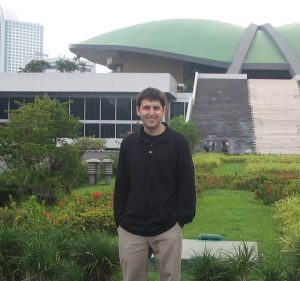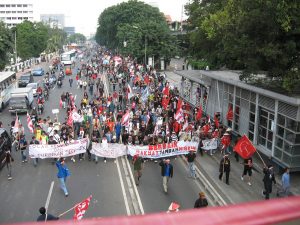Memo #146
By Nathan Allen – nallen [at] interchange.ubc.ca
 Indonesian cities have recently witnessed a wave of protests as citizens voiced complaints against a planned fuel price hike. On March 30, 2012, students in Jakarta stormed the legislature and clashed with police. Legislators have carefully adjusted their positions to distance themselves from the hated fuel price hike.
Indonesian cities have recently witnessed a wave of protests as citizens voiced complaints against a planned fuel price hike. On March 30, 2012, students in Jakarta stormed the legislature and clashed with police. Legislators have carefully adjusted their positions to distance themselves from the hated fuel price hike.
One might be forgiven for experiencing a sense of déjà vu. In 1998, a cut in fuel subsidy inspired some of the most violent battles against former President Suharto. During that feud, many legislators found it advantageous to openly criticize the unsteady autocrat. Suharto’s loss of support within Golkar, his own party, was one of the final straws that broke the regime’s back.
In 2008, during President Yudhoyono’s first term, he faced a familiar springtime crisis. Subsidies at home and soaring fuel prices abroad combined to create a massive strain on the budget. Yudhoyono, with the initial support of a broad coalition, proposed a subsidy reduction. Opponents pounced, organizing disruptive rallies with hopes of peeling off Yudhoyono’s coalition allies.
Golkar again found itself caught in a bind. As the largest party in the legislature, their support was pivotal. Many legislators wanted to oppose the unpopular fuel price hike. But their leader, Jusuf Kalla, was serving as Yudhoyono’s vice-president at the time (2004-2009). Kalla’s powerful position within the coalition helped government supporters quell internal unrest and the party followed through with its support.
The politics of the current fuel feud are different. As always, Golkar is a coalition member whose support is pivotal to government plans. But this time Golkar does not occupy the vice-presidency, a position Yudhoyono allotted to a loyal but unpopular economic advisor. For Golkar, abandoning Yudhoyono no longer means abandoning the party leader.
The looseness of the present coalition revealed itself in the heat of the battle. Early on March 31, 2012, after a last minute threat to vote against the government, Golkar managed to extract concessions, including a crowd pleasing delay of the fuel price hike.
Golkar’s maneuvering acts as a warning to future presidential candidates: if you want to lower subsidies, solidify your coalition. And if you want a solid coalition, offer your key ally the vice-presidency.
About the Author:
Nathan Allen – a PhD student in the Department of Political Science at The University of British Columbia. Writing his dissertation on the development of the Indonesian party system.
Links:
- Indonesia in 2008: Yudhoyono’s Struggle for Reelection, Asian Survey, January/February 2009.
- Fuel Fight in Indonesia, The Wall Street Journal, March 2012.
- Indonesia lawmakers deal blow to fuel price hike, Temp Interactive, March 2012.
- Golkar caught in middle of fuel tussle, The Jakarta Post, May 2008.
- Lessons Learned from Indonesia’s Attempts to Reform Fossil-Fuel Subsidies, International Institute for Sustainable Development, October 2010.
Related Memos:
- Our other Memos on Indonesia
